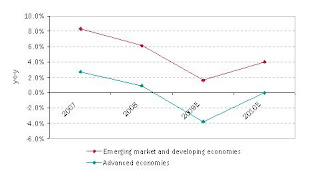Considering the ADR and local stock are for the same company, ideally they should trade at similar prices, adjusted for exchange costs. However, it is found that most of the ADRs generally trade at a premium or discount to the local. The reason for discrepancy in prices of ADRs and local stocks is many-fold. Various reasons are demand for the stock (ADR) in foreign market, limited supply of ADR and difficulty in conversion of local shares to ADRs. ADR’s of Indian companies command a premium to their domestic counterparts due to demand mainly from Exchange traded Funds (ETFs), as it is easier for foreign investors to take exposure in Indian companies via the ADR route rather than going through regulatory approvals in India. Preference for trading in local markets also plays an important part. The premium is also due to difficulty in converting common shares to ADRs, which makes it difficult for arbitrageurs to execute trade.
Coming back to the Wipro ADR. Back in January 2007, the ADR was trading at an average premium of approximately 20%. The premium was totally eradicated in March 2008. However, since then the premium again started widening, reached 58% in October 2008 and peaked at 80% in Dec 2008 before reducing to a premium of 30% in May 2009. Over the past 1 year the ADR has traded at an average premium of 48%. So how does one benefit from this discrepancy in prices? The answer is arbitrage. One way would be buying the stock from local market, converting it into the various levels of ADRs and then selling these in the foreign market. Investors in local shares also benefit in a sponsored ADR program by tendering in their shares.


Going ahead, the Indian finance ministry’s recent mandate at requiring a minimum public shareholding of 25% in listed companies may play a vital role in reducing the Wipro ADR premium. As of March 2010, Azim Premji and family held approximately 80% stake in the company, which would require them to dilute the stake by around 5%. The ideal option in this case would seem the ADR route considering they would get a premium for the shares issued there. This may in-turn result in increased ADR volumes and subsequently reduced premium for the Wipro ADR in times ahead. Reminds me of the saying…if possible…’Make hay when the sun shines!’
Stocks mentioned here are: ADR ticker: WIT US, Domestic ticker: WPRO IB

